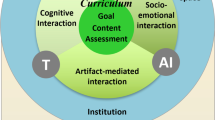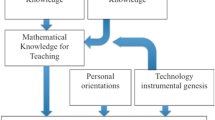Abstract
Cases have been used in mathematics teacher education with increasing prominence. Yet, there is little research that confirms cases as pedagogical tools to improve prospective teacher expertise, specifically in Asian contexts. This article illustrates how a specific case-based pedagogy was developed and implemented in Korea to increase prospective elementary teacher expertise in terms of paying attention to the mathematics-specific features of a lesson. The results showed that the participant teachers’ analytic foci moved from general to substantive features of a mathematics lesson. This tendency was evident when they reflected on their own teaching and was confirmed by their self-assessment. Given this, issues and suggestions in teacher education programs to promote teacher expertise in terms of mathematics-specific analysis ability are discussed.
Similar content being viewed by others
References
Ball, D. L., & Cohen, D. K. (1999). Developing practice, developing practitioners: Toward a practice-based theory of professional education. In L. Darling-Hammond & G. Sykes (Eds.), Teaching as the learning profession: Handbook of policy and practice (pp. 3–32). San Francisco, CA: Jossey-Bass.
Ball, D. L., & Forzani, F. M. (2009). The work of teaching and the challenge of teacher education. Journal of Teacher Education, 60, 497–511.
Borko, H., Peressini, D., Romagnano, L., Knuth, E., Willis-Yorker, C., Wooley, C., et al. (2000). Teacher education does matter: A situative view of learning to teach secondary mathematics. Educational Psychologist, 35(3), 193–206.
Desimone, L. M., Porter, A. C., Garet, M. S., Yoon, K. S., & Birman, B. F. (2002). Effects of professional development on teachers’ instruction: Results from a three-year longitudinal study. Educational Evaluation and Policy Analysis, 24(2), 81–112.
Feiman-Nemser, S. (2001). From preparation to practice: Designing a continuum to strengthen and sustain teaching. Teachers College Record, 103(6), 1013–1055.
Henningsen, M. A. (2008). Getting to know Catherine and David: Using a narrative classroom case to promote inquiry and reflection on mathematics, teaching, and learning. In M. S. Smith & S. Friel (Eds.), Cases in mathematics teacher education: Tools for developing knowledge needed for teaching (pp. 47–56). Fourth Monograph of the Association of Mathematics Teacher Educators. San Diego, CA: Association of Mathematics Teacher Educators.
Hillen, A. F., & Hughes, E. K. (2008). Developing teachers’ abilities to facilitate meaningful classroom discourse through cases: The case of accountable talk. In M. S. Smith & S. Friel (Eds.), Cases in mathematics teacher education: Tools for developing knowledge needed for teaching (pp. 73–88). Fourth Monograph of the Association of Mathematics Teacher Educators. San Diego, CA: Association of Mathematics Teacher Educators.
Kitchen, R. S., Roy, F. C., Lee, O., & Secada, W. C. (2009). Comparing teachers’ conceptions of mathematics education and student diversity at highly effective and typical elementary schools. Journal of Urban Mathematics Education, 2, 52–80.
Maher, C. A. (2008). Video recordings as pedagogical tools in mathematics teacher education. In D. Tirosh & T. Wood (Eds.), The international handbook of mathematics teacher education. Tools and processes in mathematics teacher education (Vol. 2, pp. 65–83). The Netherlands: Sense.
Markovits, Z., & Even, R. (1999). The decimal point situation: A close look at the use of mathematics-classroom-situations in teacher education. Teaching and Teacher Education, 15, 653–665.
Markovits, Z., & Smith, M. (2008). Cases as tools in mathematics teacher education. In D. Tirosh & T. Wood (Eds.), The international handbook of mathematics teacher education. Tools and processes in mathematics teacher education (Vol. 2, pp. 39–64). The Netherlands: Sense.
Merseth, K. (1996). Cases and the case method in teacher education. In J. Sikula (Ed.), Handbook of research on teacher education (pp. 722–746). New York: Simon & Schuster/Macmillan.
Merseth, K. (2003). Windows on teaching math: Cases of middle and secondary classrooms. New York: Teachers College Press.
Miller, K., & Zhou, X. (2007). Learning from classroom video: What makes it compelling and what makes it hard. In R. Goldman, R. Pea, B. Barron, & S. J. Denny (Eds.), Video research in the learning sciences (pp. 321–334). Mahwah, NJ: Lawrence Erlbaum.
National Council of Teachers of Mathematics (2007). Mathematics teaching today. Reston, VA: The Author.
Pang, J. S. (2009a). Good mathematics instruction in South Korea. ZDM-The International Journal of Mathematics Education, 41(3), 349–362.
Pang, J. S. (2009b). An analysis of mathematics instruction for the professional development of prospective elementary teachers. Research in Elementary Subject Matter Education, 11, 35–70 (in Korean).
Pang, J. S. (2011). Exploring Korean teacher classroom expertise in sociomathematical norms. In Y. Li & G. Kaiser (Eds.), Expertise in mathematics instruction: An international perspective (pp. 243–262). New York: Springer.
Santagata, R., & Guarino, J. (2010). Using video to teach future teachers to learn from teaching. ZDM-The International Journal of Mathematics Education. doi:10.1007/s11858-010-0292-3.
Shulman, L. S. (1986). Those who understand: Knowledge growth in teaching. Educational Researcher, 15(2), 4–14.
Smith, M. S., Silver, E. A., & Stein, M. K. (2005a). Improving instruction in rational numbers and proportionality: Using cases to transform mathematics teaching and learning. New York: Teachers College Press.
Smith, M. S., Silver, E. A., & Stein, M. K. (2005b). Improving instruction in algebra: Using cases to transform mathematics teaching and learning. New York: Teachers College Press.
Smith, M. S., Silver, E. A., & Stein, M. K. (2005c). Improving instruction in geometry and measurement: Using cases to transform mathematics teaching and learning. New York: Teachers College Press.
Star, J. R., & Strickland, S. K. (2008). Learning to observe: using video to improve preservice mathematics teachers’ ability to notice. Journal of Mathematics Teacher Education, 11, 107–125.
Steele, M. D. (2008). Building bridges: Cases as catalysts for the integration of mathematical and pedagogical knowledge. In M. S. Smith & S. Friel (Eds.), Cases in mathematics teacher education: Tools for developing knowledge needed for teaching (pp. 57–72). Fourth Monograph of the Association of Mathematics Teacher Educators. San Diego, CA: Association of Mathematics Teacher Educators.
Stein, M. K., Engle, R. A., Smith, M. S., & Hughes, E. K. (2008). Orchestrating productive mathematical discussions: Five practices for helping teachers move beyond show and tell. Mathematical Thinking and Learning, 10(4), 313–340.
Stein, M. K., Smith, M. S., Henningsen, M. A., & Silver, E. A. (2000). Implementing standards-based mathematics instruction: A casebook for professional development. New York: Teachers College Press.
Strauss, A., & Corbin, J. (1998). Grounded theory methodology: An overview. In N. K. Denzin, & Y. S. Lincoln (Eds.), Strategies of qualitative inquiry (pp. 158–183). Thousand Oaks, CA: Sage.
van Es, E. A., & Sherin, M. G. (2010). The influence of video clubs on teachers’ thinking and practice. Journal of Mathematics Teacher Education, 13(2), 155–176.
Author information
Authors and Affiliations
Corresponding author
Rights and permissions
About this article
Cite this article
Pang, J. Case-based pedagogy for prospective teachers to learn how to teach elementary mathematics in Korea. ZDM Mathematics Education 43, 777–789 (2011). https://doi.org/10.1007/s11858-011-0352-3
Accepted:
Published:
Issue Date:
DOI: https://doi.org/10.1007/s11858-011-0352-3




